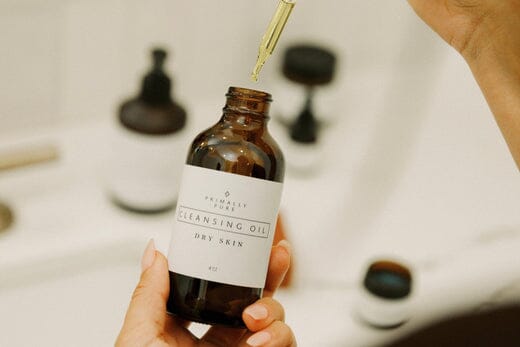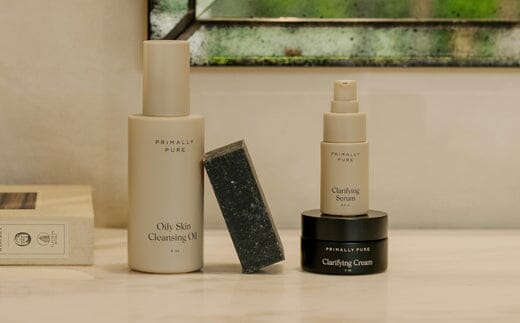Clear Your Skin From Within: Q&A With Acne Nutritionist
Summary
Learn about the six root causes of acne your doctor may be overlooking, and Maria's favorite foods for remedying common skincare concerns like acne scarring, oily skin, and more.We chatted with acne nutritionist, Maria Marlowe on the underlying dietary and lifestyle causes of acne. Keep reading to learn about the six root causes of acne your doctor may be overlooking, and Maria's favorite foods for remedying common skincare concerns like acne scarring, oily skin, and more.
What inspired you to become an acne nutritionist?
"After personally struggling with acne for nearly 5 years despite trying all the things, I finally cleared my skin by changing my diet and improving my gut health. When I initially discovered the concept of food as medicine, I was skeptical at first, but desperate and willing to try anything to clear my skin. I dove in 110%, and my skin cleared in a matter of 3 months. I was in awe of my own transformation and became obsessed with nutrition, which eventually led me to change career paths to study both nutrition and healthy cooking."
In The Clear Skin Plan, you outline six root causes of acne that your doctor may overlook - what are they and how do we remedy them?
"1) Chronic Inflammation: Inflammation is now believed to be the primary driver of acne, not bacteria. So much so that after decades of scientific research demonstrating this, acne was reclassified from a bacterial infection to an inflammatory condition in the early 2010s. Inflammation is heavily influenced by our diet and lifestyle choices. Following an anti-inflammatory diet, limiting or avoiding pro-inflammatory processed foods, keeping blood sugar balanced, exercising regularly, getting enough sunshine (vitamin D), and lowering stress are all helpful.
2) Nutrient Deficiencies: Acne patient’s nutrient levels are typically not tested, however, there are plenty of studies that show individuals with acne are more likely to be low in vitamin A, vitamin D, omega-3, and/or zinc. Typically, the greater the deficiency, the more severe the acne.
3) Gut Dysbiosis: People with acne are more likely to lack lactobacillus and bifidobacteria in their gut which provide anti-inflammatory benefits, and may have higher levels of pro-inflammatory bacteria which may contribute to breakouts. Constipation can contribute to hormone imbalances and is associated with a greater chance of acne. Ideally, you want to have 1 to 3 well-formed, complete bowel movements a day. If they are hard and pebbly or loose, that also needs to be corrected. Eating enough fiber, drinking enough water, daily movement and consuming probiotics daily can all help.
4) Blood Sugar Imbalance: Most people associate acne with a hormone imbalance and although hormones are involved in acne formation, your hormones are not the real problem. They are messengers responding to the inputs they have been given. The habits causing them to become unbalanced are the problem.
For example, excess sugar consumption has been shown to increase testosterone levels in women which is known to increase the risk of acne. Of course there are many other factors that influence hormones (e.g. stress, sleep, gut health, nutrient deficiencies, endocrine-disrupting chemicals, etc.), but in my experience, blood sugar dysregulation is a common issue - even amongst those who think they are eating healthy. Working with a nutritionist can help you learn how to keep your blood sugar stable.
5) Stress: Mental stress impairs the gut and skin barrier, increases inflammation, and is linked to breakouts. There are many modalities you can try to relieve stress such as breathwork, meditation, sound healing, yoga, nature walks, or a hobby, like painting or gardening. Find what works for you.
6) Harsh Skincare: Most acne products are made with harsh ingredients in an attempt to "scrub away the dirt" or peel off the top layer of skin. The paradox is that using harsh products, overwashing or scrubbing can disrupt the skin barrier and microbiome which can lead to greater inflammation and skin sensitivity. That’s why I love Primally Pure products and recommend them to all of my clients. Gentle and natural is effective! The skin knows how to heal and repair itself - let it do its job with minimal interference."
What causes oily skin?
"I always say oily skin is not a type of skin, it is a state of skin, heavily influenced by our diet and stress.
Certain foods like conventional dairy and excess refined sugars can cause your skin to become more oily. Too much testosterone for women can also create excess oil, but as mentioned above, consuming too much sugar can cause excess testosterone! So a powerful remedy for oily skin is limiting your sugar consumption and keeping your blood sugar levels more stable. Stress can also cause your sebaceous glands to pump out more oil. With that said, we do need some oil on our skin and overwashing and stripping the skin of too much oil can cause it to overcompensate and actually produce more oil - not less."
In your opinion, what are the best foods for fighting acne?
"If you look throughout history and across the globe, it’s evident that acne is less prevalent in cultures who maintain a traditional diet filled with nutrient dense foods like vegetables, fruit, high quality animal protein, and healthy fats. Whole foods provide your body with the nutrients it needs, aid in regularity and digestion, and help keep your blood sugar stable. Probiotics (from fermented foods and supplements) are also incredibly beneficial.
For stress acne, matcha and green tea may help by reducing the stress hormone cortisol. Cortisol disrupts the gut and is associated with an increase in oil production.
For hormonal acne, bitter foods like arugula or dandelion greens and cruciferous vegetables like broccoli, cauliflower, or kale support liver health, detoxification, and hormone balance.
Seed oils, including canola, corn, cottonseed, soy, sunflower, safflower, grapeseed, and rice bran should be replaced with healthier options, like extra virgin olive oil due to their inflammatory nature. The plastic bottles they are stored in can also leach phthalates and xenoestrogens into the oil, which can contribute to hormone imbalances."
What foods do you recommend for common nutrient deficiencies associated with acne?
"Vitamin A is primarily found in organ meat, which many people don't consume. If you don't like the taste of beef liver, try a high quality cod liver oil instead. Aim to consume plenty of dark leafy greens, orange veggies and fruit rich in beta-carotene as the body converts it into Vitamin A. This form is less bioavailable, so I recommend consuming both animal and plant sources.
For Vitamin D, spend some time in the sun sans sunscreen (there is an app called D-minder that will help you determine how much sun you need based on your skin type and location). You can also get it from fatty fish like wild salmon, a high quality cod liver oil, or UV treated mushrooms.
For omega-3, consume wild seafood or algae, and omega-3 rich seeds like flax, hemp, or chia.
Zinc is found in red meat and shellfish like oysters, crab, or shrimp. Plant-based foods like legumes and seeds contain zinc too, however, they also contain phytates which inhibit the absorption of zinc and other minerals. So it's important to soak and sprout your legumes, grains, and seeds to reduce the phytates. This will make them easier to digest and the nutrients more bioavailable. You can usually find sprouted legumes, seeds, and grains in health food stores."
What foods would you recommend for preventing + fading acne scarring?
"The amount of scarring we get from a particular pimple comes down to the amount of inflammation and how long it lasted. So bringing inflammation down stat is key, both topically and internally. Internally, antioxidant rich and anti-inflammatory foods like ginger, turmeric, ground flaxseed, wild salmon, and wild organic blueberries are some of my favorite choices. Consume plenty of them when you first notice the pimple and continue until it's gone (and beyond!)"
What role do animal products play in skin health?
"Animal products provide protein and a variety of micronutrients vital for clear, healthy skin. Some of my favorites include beef liver and bone broth.
For example, beef liver is rich in vitamin A, which aids in normal skin cell turnover and wound healing. It’s filled with a number of skin loving nutrients including B-vitamins, iron, copper, and more.
Bone broth is a rich source of collagen which supports a healthy gut lining, and in turn, healthy skin (not to mention it also supports immunity and is beneficial for dealing with auto-immune issues). On days where I can't get my hands on bone broth, I love a high quality, grass-fed collagen supplement, as research shows it helps with preventing and reversing wrinkles and supporting nail, hair, and joint health.
All animal products are an excellent source of complete protein, including all of the essential amino acids our bodies need. Our bodies use proteins from food to build and repair tissues, as well as make hormones and enzymes. Protein strengthens and provides structure to the skin and plays a pivotal role in wound repair (especially helpful if you've accidentally popped something)."
Why is eating organic food so important?
"According to the Environmental Working Group, nearly 75% of non-organic fresh produce sold in the U.S. contains residues of potentially harmful pesticides. Organic food is typically richer in nutrients and antioxidants compared to conventionally grown foods. It also lowers your exposure to hormone-disrupting and carcinogenic chemicals found in conventional pesticides and herbicides. I recommend buying as much produce as you can organic, and relying on the EWG Dirty Dozen and Clean 15 list to help make informed decisions about the most important produce to choose organic for.
This also applies to animal products. Ideally look for pasture-raised, 100% grass-fed and grass-finished meats, organic pasture-raised eggs and poultry, and wild caught seafood. When an animal is allowed to eat its natural diet and given the space it needs, it will be healthier, and consequently the meat will be more nutritious than its conventionally farmed counterparts. Note: organic is not a term to look for on seafood, as it doesn't mean much."
To learn more about the connection between nutrition and skin health follow Maria Marlowe on on Instagram or visit her website.
Pin your fav blog post below:

- Tags: Skincare Tips Wellness


Leave a Comment